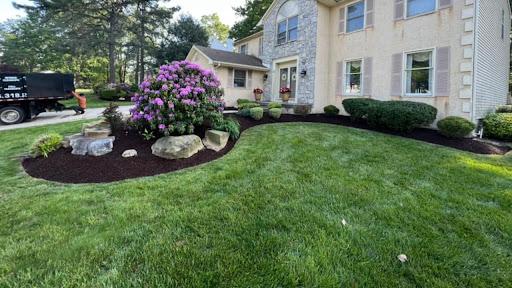BLOGS

How to Design Landscaping for Different Soil Types?
To design landscaping for different soil types, choose plants suited to the soil conditions: drought-tolerant plants for sandy soil, wet-tolerant plants for clay soil, and a variety for loamy soil. For rocky or shallow soils, use native plants and raised beds, adjusting irrigation and soil amendments as needed.
Designing a successful landscape involves more than just choosing beautiful plants and arranging them aesthetically. The type of soil you have plays a crucial role in determining which plants will thrive and how to maintain a healthy garden. Soil types vary widely, and understanding these differences can make or break your landscaping efforts. This article will explore how to design landscaping for different soil types—clay, sandy, and loamy—and offer practical solutions for each.
At Freedom Landscaping, we're dedicated to helping you create the perfect outdoor space, regardless of your soil type. Our team of experienced landscapers in Sicklerville, NJ, is here to turn your vision into reality.
Key Takeaways
Understand soil characteristics to choose appropriate plants and design solutions.
Implement soil amendments and water management techniques tailored to soil types.
Group plants with similar needs to simplify maintenance and improve landscape cohesion.
Regular soil testing helps in making informed decisions about soil amendments and plant choices.
Professional landscaping services can optimize your landscape design based on soil conditions.
Understanding Soil Types
1. Clay Soil
Characteristics: Clay soil is dense, retains moisture well, and tends to become compacted, which can lead to poor drainage and root growth issues.
Landscaping Solutions:
Improve Drainage: Incorporate organic matter like compost to enhance soil aeration and drainage. Adding sand or gypsum can also help break up clay and improve its structure.
Plant Selection: Choose plants that can handle moist conditions, such as willows, certain ferns, and hostas. Avoid plants that require well-drained soil, as they may struggle in clayey conditions.
2. Sandy Soil
Characteristics: Sandy soil drains quickly and does not retain moisture well, often leading to nutrient leaching and dry conditions.
Landscaping Solutions:
Water Retention: Add organic matter like compost to improve moisture retention. Mulching can also help reduce evaporation and maintain soil moisture.
Plant Selection: Opt for drought-resistant plants, such as succulents, ornamental grasses, and native plants that are adapted to dry conditions.
3. Loamy Soil
Characteristics: Loam is a balanced mix of clay, sand, and silt, offering excellent fertility and drainage. It’s the ideal soil for most types of landscaping.
Landscaping Solutions:
Versatile Planting: Loam supports a wide range of plants, from vibrant flowers to robust shrubs and trees. Take advantage of this by incorporating diverse plant species.
Soil Maintenance: Regularly add organic matter to maintain soil fertility and structure. This practice helps in sustaining a healthy and productive garden.
General Landscaping Tips for Different Soil Types
Soil Testing: Conduct a soil test to determine pH levels, nutrient content, and any deficiencies. This information is crucial for amending soil and selecting suitable plants.
Amending Soil: For clay and sandy soils, organic matter is key. Compost, peat moss, or well-rotted manure can improve soil structure and nutrient content, enhancing plant growth.
Water Management: Tailor irrigation systems to the soil type. For clay soils, consider incorporating drainage solutions, while sandy soils may need more frequent watering.
Plant Grouping: Group plants with similar water and nutrient needs to create a cohesive landscape. This approach simplifies maintenance and enhances the overall appearance of your garden.
Soil Testing for Home Gardens
Soil testing is a crucial step for effective landscaping. By analyzing your soil's pH, nutrient levels, and composition, you gain insights into its health and fertility. This information allows you to make informed decisions about necessary amendments and suitable plant selections. Understanding your soil's specific needs helps in creating a thriving garden and prevents issues related to nutrient deficiencies and imbalances. A comprehensive soil test serves as a roadmap for improving soil quality, ensuring optimal plant growth, and achieving a flourishing outdoor space.
pH Levels: Determines the soil's acidity or alkalinity, influencing plant health.
Nutrient Content: Identifies essential nutrients and deficiencies.
Soil Composition: Reveals the soil’s texture and structure.
Organic Matter for Soil Improvement
Organic matter, including compost, peat moss, and manure, is vital for enhancing soil health. It improves soil structure, increases nutrient content, and boosts moisture retention. Adding organic matter to clay or sandy soils can significantly enhance their texture and fertility, making them more conducive to planting. Incorporating these materials into your landscaping practices helps create a more productive and supportive environment for plants, ultimately leading to a healthier and more vibrant garden.
Compost: Enriches soil with essential nutrients and improves soil structure.
Peat Moss: Enhances soil moisture retention and acidity.
Manure: Provides a rich source of nutrients and organic matter.
Effective Irrigation Techniques
Proper irrigation is essential for maintaining plant health and addressing water-related issues. Different soil types necessitate specific irrigation strategies to ensure adequate moisture levels. For clay soils, focus on minimizing runoff and improving drainage to prevent waterlogging. Sandy soils, on the other hand, may require more frequent watering due to their rapid drainage. Employing the right irrigation techniques helps in optimizing water usage, supporting plant health, and creating a thriving garden environment.
Clay Soils: Implement drainage solutions and avoid overwatering.
Sandy Soils: Use more frequent watering and mulching to retain moisture.
Irrigation Systems: Explore drip irrigation, soaker hoses, and rain barrels for efficient water management.
FAQs
1. What soil type is best for landscaping? Loamy soil is ideal for most landscaping needs due to its balanced texture and fertility. It supports a wide range of plants and requires minimal amendments.
2. How can I improve clay soil for better landscaping? Incorporate organic matter like compost to improve drainage and soil structure. You may also add sand or gypsum to enhance soil aeration.
3. What plants are suitable for sandy soil? Drought-resistant plants such as succulents, ornamental grasses, and native plants are well-suited for sandy soil conditions.
4. How often should I water plants in sandy soil? Plants in sandy soil may need more frequent watering due to the soil's rapid drainage. Regularly check soil moisture levels and adjust your watering schedule accordingly.
5. Can I change the soil type in my garden? While you can't completely change the soil type, you can amend it to improve its characteristics. Adding organic matter, adjusting pH levels, and incorporating drainage solutions can enhance soil quality and support better plant growth.
Transform Your Landscape with Freedom Landscaping
Unlock the full potential of your outdoor space with Freedom Landscaping. Understanding the characteristics of different soil types and implementing the right landscaping solutions can make a significant difference in your garden's health and beauty.
Contact us now at Freedom Landscaping for a free quote and let our skilled landscapers in Sicklerville, NJ, help you design the perfect garden for your soil type. Experience the freedom of a beautifully crafted landscape tailored to your needs.
Ready To Give Your Property The Love It Deserves?
Whether it is keeping your lawn professionally maintained or completely re-vamping the look of your landscape, let our team of professional landscapers at Freedom Landscaping take your property to a whole new level!
Contact Us
Mon - Sat: 7:00 am - 6:00 pm
Sunday: Closed
© 2024 Freedom Landscaping LLC. All Rights Reserved. Privacy Policy. Terms & Conditions. Web Design By Fused Media.


